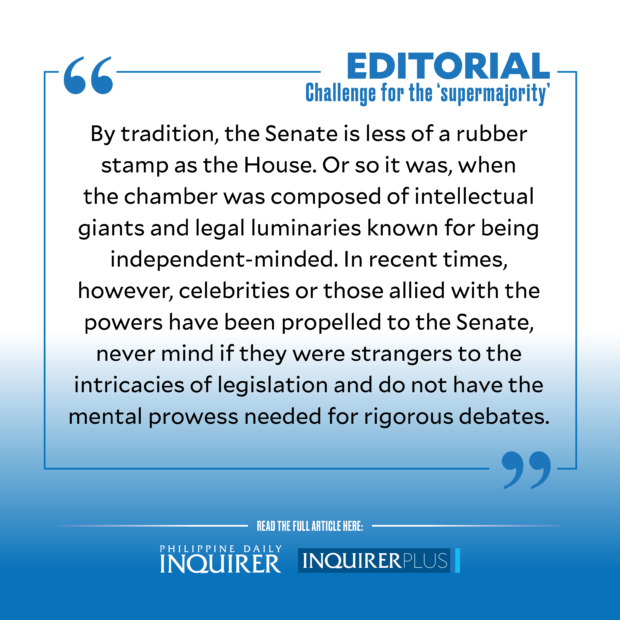Challenge for the ‘supermajority’
With Pampanga Rep. Gloria Macapagal-Arroyo out of contention for leadership of the House of Representatives, Leyte Rep. Martin Romualdez is all set to become the new speaker at the opening of the 19th Congress in July.
Similarly, the path is clear for newly re-elected Sen. Juan Miguel Zubiri to be the chosen Senate president after Sen. Cynthia Villar dropped her intention to contest the chamber’s highest post.
The effect of these unusually quick alignments for leadership in the Senate and the House, normally bitterly contested, is the certainty of incoming President Ferdinand Marcos Jr. having a “supermajority” in Congress. It is a given, with the massive 31 million votes Filipinos gave Marcos Jr. at the polls.
It’s a no-brainer that most of the 300-plus House members will join the coalition of the victor, the better to partake of the pork and perks accessible to members of the majority. And with no less than a cousin of the incoming president as the new speaker, the House is certain to be squarely behind the chief executive’s legislative agenda and executive decisions. This augurs well for the new president’s priorities, chiefly the passage of the national budget and tax measures needed to meet the daunting economic challenges, including the gargantuan debts, left by the Duterte administration.
By tradition, the Senate is less of a rubber stamp as the House. Or so it was, when the chamber was composed of intellectual giants and legal luminaries known for being independent-minded. In recent times, however, celebrities or those allied with the powers have been propelled to the Senate, never mind if they were strangers to the intricacies of legislation and do not have the mental prowess needed for rigorous debates. Who can argue with the more than 26 million Filipinos who voted an action star as their number one senator last May 9? The fact that only one opposition candidate — Sen. Risa Hontiveros — made it to the winning circle of 12 new senators also speaks to the voters’ desire to have a Senate friendly to the president.
The possibility of having a supermajority Senate (with only two senators comprising the minority so far) is such a palpable scenario that Senate President Vicente Sotto III turned emotional at the Senate’s last session when “graduating’’ senators like him delivered their valedictory speeches last week. “Maintain the integrity and independence of the Senate,” he urged his former colleagues and the new lawmakers. Coming from one who had been criticized for his staunch support of Mr. Duterte’s controversial policies when he led the chamber, the appeal may not have the desired weight to make a dent.
But apparently said with the benefit of hindsight, Sotto’s advice certainly merits consideration by the incoming Senate. Because of its vaunted tradition and institutional integrity, the Senate is in a better position to fulfill the constitutional mandate of providing the needed checks and balances to the other branches of government, particularly Malacañang. With oversight powers and the authority to conduct investigations and inquiries in aid of legislation, the Senate must continue to scrutinize the executive’s policies and vast powers when these are inimical to public interest.
That is not to say that the Senate, or the House, should be obstructionist. It is the task of the two houses to come up with laws responsive to our times and to support the government in doing its job. The Constitution gives the House the “power of the purse’’ to ensure that taxpayer money is properly allocated and spent where they are intended. Similarly, the Senate has the duty to closely examine policies to promote accountability and prevent corruption and abuse of power.
The anomalous Pharmally pandemic deal is a case in point. A majority of senators, allied with Mr. Duterte and Marcos Jr., refused to sign the blue ribbon committee report because they objected to Mr. Duterte’s inclusion among the personalities recommended to be charged for the alleged overpricing and anomalies in the purchase of at least P11 billion in pandemic supplies. Two Pharmally executives walked out of detention last week, without being made to answer for one of the biggest corruption cases under the Duterte administration. A former Duterte adviser has not been held accountable, either. While these senators’ defense of the outgoing president might have some merit, they also recklessly abandoned the chance to get to the bottom of the criminal squander of pandemic funds. Will the new Senate have the courage to go after the Pharmally cabal under the incoming administration?
Filipino voters have given Marcos Jr. a large mandate to lead them. The “supermajorities” in the legislative branch can best honor this mandate, not by blind obedience, but by exercising diligence and judicious pushback when called for to make sure that the new government will “do well” as the president-elect has so earnestly promised.
MORE EDITORIALS





















